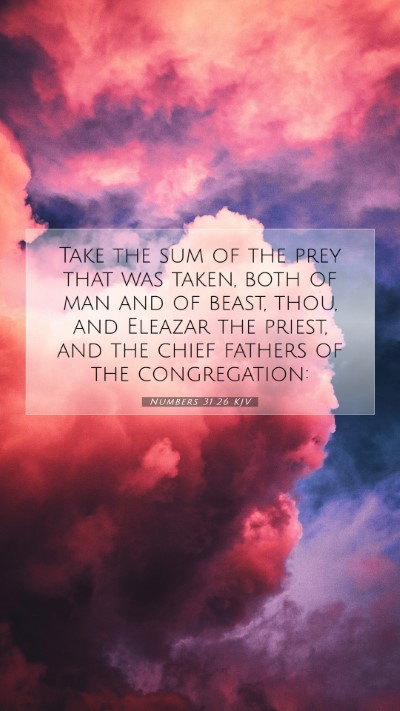Understanding Numbers 31:26
Numbers 31:26 states:
"Take the sum of the prey that was taken, both of man and of beast, thou, and Eleazar the priest, and the chief fathers of the congregation."
This verse comes at a significant point in the narrative of the Israelites' journey in the wilderness. It follows the military victory over the Midianites and the subsequent instructions from Moses regarding the division of the spoils.
Bible Verse Interpretations
The instruction to take a census of the spoils highlights several core themes in biblical narrative:
- Divine Guidance in Warfare: The victory over the Midianites was not achieved through human strength alone, but through obedience to God’s command. This reflects the broader theme of reliance on divine authority in Israel’s battles.
- Accountability: By instructing the leaders to take an account of the spoils, Moses emphasizes the importance of accountability. This would ensure that the distribution of goods was done fairly and according to God’s order.
- Duty of the Priesthood: The involvement of Eleazar the priest indicates the integral role of the priesthood in all matters of Israel’s governance, blending the sacred with the secular, a recurring theme in the Pentateuch.
Bible Verse Explanations
This verse serves several practical functions within the narrative framework of Numbers:
- Logistical Management: Counting the spoils was a practical step in managing the resources gained from their victory, showcasing the organized nature of Israelite leadership.
- Community Welfare: The spoils were meant for the welfare of the community, indicating a collective benefit from their victories rather than individual gain.
- Spiritual Significance: The act of counting the spoils can also symbolize the acknowledgment of God’s provision and blessing, reinforcing the spiritual dimension of their military successes.
Bible Study Insights
Engaging with this scripture can yield rich Bible study insights:
- Theme of Victory and Provision: Analyze how victories in the Bible often lead to moments of reflection on God’s provisioning.
- Role of Leadership: Discuss the characteristics of effective biblical leaders as shown in Moses’ leadership and military strategy.
- Accountability in Community: Explore the biblical perspective on communal responsibility and the importance of fair distribution of resources.
Biblical Exegesis
Exegesis of Numbers 31:26 reveals deeper meanings rooted in context:
- Historical Context: This verse sets the stage for the Israelites’ societal structure post-exodus, where order in the community was essential for survival and success.
- God's Law and Order: Reflect on how this command underscores God’s desire for orderliness even in the chaos of war.
- Foreshadowing Future Practices: This act of counting and distributing could be seen as foreshadowing later Israelite practices regarding warfare and spoils, especially in prophetic and messianic contexts.
Application of the Verse
This verse can be applied in various aspects of daily life:
- Integrity in Leadership: Leaders today can draw lessons about accountability and transparency from this scripture.
- Community Sharing: Reflect on the importance of sharing resources equitably within communities as taught in this passage.
- Restoration and Provision: Identify personal ‘spoils’ in one’s life and consider how these can be used for the greater good, acknowledging God’s provision.
Cross References
This verse relates to several other passages within the Bible that further illuminate its meaning:
- Deuteronomy 20:14 - God's instructions regarding spoils from conquests.
- Exodus 30:12 - The census tax and its importance.
- Joshua 22:8 - Distribution of spoils among the tribes of Israel.


